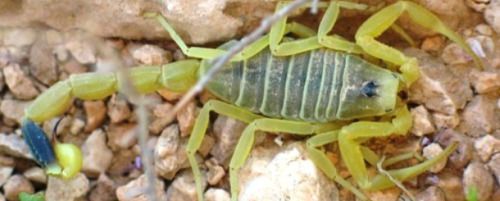An Israeli researcher is modifying the toxins in scorpion venom in an attempt to create an ecologically sound insecticide that won’t harm honeybees or humans.

An Israeli researcher is developing an unusual way to discourage insects from destroying our crops – by putting an extra sting in the insecticide.
Prof. Michael Gurevitz of Tel Aviv University (TAU) has isolated the genetic sequences of some important neurotoxins in scorpion venom, and is developing a way to use them as an ecologically safe pesticide that can kill moths, locusts, flies and beetles, without harming honeybees or humans.
Scorpions are notoriously poisonous, particularly the Israeli yellow scorpion, which is one of the most poisonous in the world. They deliver powerful paralyzing venom made up of poisonous peptides that can immobilize animal prey on the spot.
In his research Gurevitz, who is searching for an effective mode of delivery for his new insecticide, found that certain neurotoxins in scorpions are highly active against some insects like leaf-eating moths, locusts, flies and beetles, but have no effect on beneficial insects like honeybees or on mammals like humans.
Scorpion venom a goldmine for insecticidal agents
“Two decades ago I realized that scorpion venom is a goldmine for possible insecticidal and therapeutic agents. This raised the question of how to use them as ecologically-safe agents against insects in a farmer’s fields, or in medicinal disorders,” says Gurevitz, who is considered one of the world’s pioneers in this field.
In his first attempt to use neurotoxins to kill infecting insects, Gurevitz inserted a neurotoxin gene into a plant genome in the hope that the plant would produce toxins that would kill the insects. The attempt failed, however. Gurevitz discovered that as a peptide, the toxin was metabolized in the insect guts, and was not able to impact the nervous system.
Since scorpion toxins must be modified to be able to penetrate the blood stream of an infesting insect, Gurevitz says it is important to study the toxins and the way they interact with the insect nervous system. Only then will it be possible to modify them in such a way as to reach their target tissues in insects, he says. This is the direction he is working on now.
Gurevitz, who works at TAU’s department of plant sciences, spent six years as a research fellow at Washington University in St. Louis and Michigan State University, beginning his scorpion studies while an M.Sc. student in Jerusalem 35 years ago.
Since then, he has developed methods of toxin gene cloning, production and modification in his lab, laying the groundwork for an entirely new molecular field based on the venom of the deadly insect.
Still searching for environment and human-friendly compounds
Now he’s also exploring a different approach. Gurevitz has developed genetic methods for producing and manipulating the desired toxins in bacteria. He is now investigating how they affect insects and mammals, paving the way for their potential use in the agriculture industry.
The agriculture industry already uses mostly pyrethroids, which also penetrate into insects and attack their nervous systems, leading to paralysis and death. Their main drawback, however, is the lack of specificity and the danger these compounds pose to the environment, livestock and humans.
“Why not harness potent natural compounds that venomous animals developed during millions of years of evolution?” asks Gurevitz, who has published numerous papers on the subject. “I am developing the science so we can learn how to use them, and to learn how to produce agents to mimic their effect yet maintain specificity to certain kinds of insects.”
Gurevitz recently published a paper in the journal Molecular Biology and Evolution that demonstrates how computational analyses at the gene sequence level lead to better understanding of how to manipulate toxin activity.












